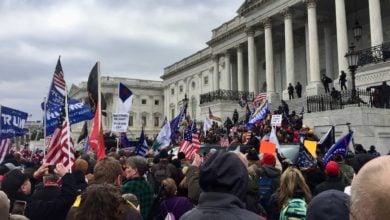As the state legislative session in
Florida begins, the working class is increasingly becoming a target
by lawmakers. The anti-worker state session began quickly, starting
on March 7 when a senate committee held a hearing on SB830, a bill
that would prohibit unions from automatically collecting dues from
paychecks (a voluntary deduction that workers decide to have) and
would prohibit dues money from being used in political activity.
Workers, students, and activists stood
outside the meeting with tape over their mouths to represent the
silencing of workers’ voices that this bill represents. The following
day saw statewide rallies called “Awake the State,” which took
place in 32 cities to oppose the attacks on workers by the state’s
Republican Party. The event drew out over 10 thousand people
statewide, dwarfing the Tea Party rallies in Tallahassee and
elsewhere in the state.
These rallies were also held in
opposition to the renewed attack on teachers and public education in
Florida. Last year, SB6 would have pegged teachers pay to student
test scores, ignoring the various factors that go into test results.
However, due to intensive grassroots activism, then governor Charlie
Crist vetoed the bill. However, a version of the union-busting bill
has been revived in the new legislative session and is likely to
pass.
Attacks on unemployed workers
In addition to the legislative attacks
on collective bargaining and on teachers, hundreds of unemployed
workers and their supporters protested in Tallahassee to oppose House
Bill 7005, which cuts unemployment benefits. HB 7005 reduces the
number of weeks of unemployment compensation from 26 weeks to 20
weeks, and also cuts the taxes imposed on business which are used to
pay for unemployment. The bill passed the full house March 10.
It is estimated that 400,000 Floridians currently receive
unemployment benefits: the state’s unemployment rate is about 12
percent. About 1 million people in Florida are without jobs.
The South is home to nine of the 10
states in the United States that have no collective bargaining rights
for public workers, and Rick Scott recently made it known that he
would like to see Florida become the 11th state (after
having previously said that he did not want to go after those
rights).
This shows the importance of organizing
in the South, where workers are disproportionately denied a voice.
Southern workers are now organizing in spite of these unfavorable
conditions. While public sector workers in Wisconsin and Ohio fight
to keep their collective bargaining rights, public workers in the
South should begin fighting for those rights in the first place!
These anti-worker attacks follow
attacks by governors across the country, as does the effort to fight
back by workers. Only a fight back movement that advocates worker
power can stop these attacks and move the workers movement forward.
In Florida, workers are beginning to build a movement that will fight
back!






